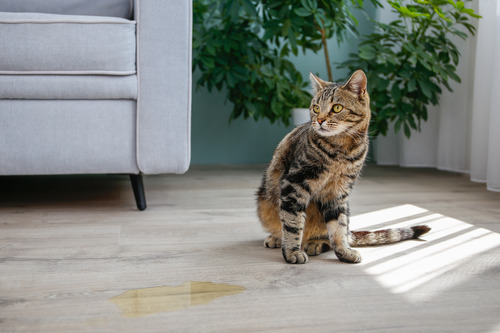Cats are meticulous by nature, often delighting us with their cleanliness and routine habits. So, when your feline companion suddenly starts peeing on the floor, it can feel both puzzling and concerning. This behavior is rarely random and often signals an underlying issue, whether related to health, environment, or emotional well-being. If your cat is exhibiting this behavior, North Jersey Animal Hospital can assess and treat your cat to hopefully restore harmony to your household. Call us today at (973) 595-8600 or request an appointment online to address your concerns and find a solution that works for you.
Stress and Anxiety in Cats
Stress and anxiety are leading causes of litter box issues in cats. Changes in their environment, such as moving to a new home, introducing a new pet, or even rearranging furniture, can make your cat feel insecure. Cats are creatures of habit, and disruptions to their routine can lead to undesirable behaviors like peeing on the floor.
Signs of Stress in Cats
- Excessive grooming
- Hiding more than usual
- Decreased appetite
- Increased vocalization
If your cat is experiencing stress, they may avoid the litter box because they associate it with their anxiety. Creating a calm and consistent environment can alleviate their stress. Providing a quiet space with familiar items can help your cat feel more at ease.
Medical Issues That Can Cause Inappropriate Urination
When asking, “Why is my cat peeing on the floor?” It’s essential to consider potential medical problems. A variety of health issues can lead to changes in litter box habits, and addressing these conditions promptly is vital.
- Urinary Tract Infections (UTIs): UTIs can cause discomfort, leading cats to avoid the litter box. Frequent urination or straining are common symptoms.
- Bladder Stones: These can make urination painful and may result in accidents outside the box.
- Kidney Disease: A condition often seen in older cats, kidney disease increases water consumption and urination.
- Diabetes: Cats with diabetes often drink and urinate more, making accidents more likely.
If you suspect a medical issue, consult your veterinarian. They can perform diagnostic tests to determine the cause and recommend appropriate treatment. Call North Jersey Animal Hospital at (973) 595-8600 to schedule an appointment or request one online.
Problems with the Litter Box
Sometimes, the litter box itself is the problem. Cats are particular about their bathroom habits, and issues with the litter box can lead to avoidance. Addressing these concerns can help restore proper litter box use. Possible issues to consider may be:
- Cleanliness: Cats prefer a clean litter box. Scoop daily and change the litter regularly.
- Size and Accessibility: Ensure the box is large enough for your cat to move comfortably and is easy to access.
- Location: Place the litter box in a quiet, low-traffic area. Cats need privacy, and noisy or busy spaces can deter them.
- Type of Litter: Cats may have preferences for certain types of litter. Experiment with different textures and scents to find what your cat prefers.
- Number of Litter Boxes: If you have multiple cats, providing additional litter boxes can also help. The general rule is to have one more litter box than the number of cats in your home.
Behavioral Issues
Behavioral factors can also explain why your cat is peeing on the floor. Marking territory or displaying dissatisfaction with their environment are common reasons.
Marking Behavior
Cats mark territory by spraying urine. This behavior is more common in unneutered males but can occur in any cat. Marking often happens when a cat feels threatened or wants to assert dominance. Neutering or spaying your cat can reduce this behavior significantly.
Addressing Behavioral Concerns
If marking is not the issue, other behavioral factors may be at play. Boredom, lack of stimulation, or conflicts with other pets can lead to inappropriate urination. Providing toys, enrichment, and opportunities for exercise can help resolve these problems.
Age-Related Changes
Older cats may develop age-related conditions that affect their litter box habits. Arthritis, cognitive dysfunction, and declining vision can make it difficult for them to use the litter box properly.
Supporting Senior Cats
- Use a low-sided litter box for easier access.
- Place the litter box in easily accessible areas.
- Schedule regular veterinary check-ups to monitor your cat’s health.
Age-related changes require patience and adjustments to your cat’s environment. With proper care, you can help your senior cat maintain good litter box habits.
Why Seeking Professional Help Matters
Inappropriate urination is not only frustrating but also a sign that something may be amiss with your cat’s health or environment. Identifying the underlying cause requires a thorough evaluation of your cat’s behavior, health, and living conditions. Consulting your veterinarian is the best way to address the issue effectively. At North Jersey Animal Hospital, our team is here to help you and your cat. Whether the problem stems from medical issues or environmental factors, we’ll work with you to find the best solution. Call us today at (973) 595-8600 or request an appointment online to get started.





